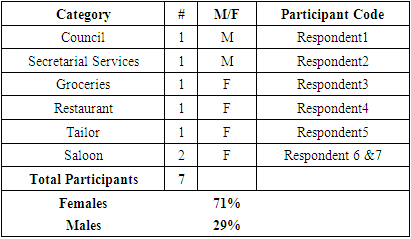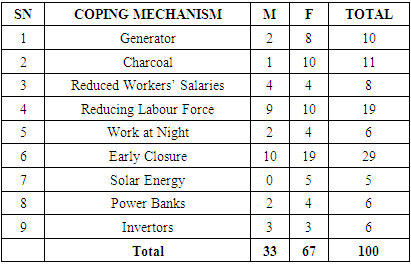-
Paper Information
- Paper Submission
-
Journal Information
- About This Journal
- Editorial Board
- Current Issue
- Archive
- Author Guidelines
- Contact Us
Management
p-ISSN: 2162-9374 e-ISSN: 2162-8416
2023; 13(1): 15-20
doi:10.5923/j.mm.20231301.02
Received: Mar. 8, 2023; Accepted: Mar. 25, 2023; Published: Apr. 15, 2023

Load Shedding and Coping Business Mechanisms of SMES: Case of Female Entrepreneurs in Lusaka Kabwata Market
1Graduate School of Business, University of Zambia, Lusaka
2Department of Electrical and Electronics Engineering University of Zambia, Lusaka
Correspondence to: Lombe Charity, Graduate School of Business, University of Zambia, Lusaka.
| Email: |  |
Copyright © 2023 The Author(s). Published by Scientific & Academic Publishing.
This work is licensed under the Creative Commons Attribution International License (CC BY).
http://creativecommons.org/licenses/by/4.0/

Load shedding is an unavoidable phenomenon not only in developing countries, but as well as developed countries of the world. Unavoidable due to various reasons among them: high demand for electrical power; effect of climate change; low substantive investment in electricity generation capacity; urbanization and rising incomes. Zambia is not exempted to such. The irony is that most Zambians based in urban areas use hydro energy for various purposes, and yet load shedding has continued to disrupt economic activities, hence this study was undertaken at Kabwata Market in Lusaka Zambia entitled, “load shedding and coping business mechanisms of SMEs: Case of female entrepreneurs in Lusaka’s Kabwata Constituency”. The specific objectives were to determine: The effect of load shedding on production, profit and workers; the effect of load shedding on socio-economic life of female proprietors of SMEs; the coping business mechanisms and their effectiveness on the enterprises’. Being centred on stress to adapt to new environment caused by load shedding, the study was anchored on the theory of cybernetic theory by both Edwards and theory of stress by Lazarus and Folkman. The research, therefore, used a theory that integrates stress and how they coped up with it. The research employed descriptive design for both qualitative and quantitative data of a case study, where a total of 100 respondents were randomly selected and key informants were interviewed. A questionnaire and depth interviews for Key Informants were used to collect data. Descriptive analysis was used on quantitative data to generate statistics and qualitative data collected was analysed using thematic analysis to triangulate the findings. The research revealed that production, profit and workers and socio-economic life were negatively affected as a result of loadshedding. Various coping mechanisms were identified. However, most of the coping mechanisms of most owners of those SMEs were less effective as compared to the use of energy power. The research concludes that load shedding had far more negative impacts on the female businesses of SMEs at Kabwata Market in Kabwata Constituency of Lusaka. Its impact was evidently portrayed on production, profit and workers and finally trickled down to the socio-economic life of the female proprietors of SMEs. However, most of the coping mechanisms of most owners of those SMEs were found be less effective. Major recommendations were made among them: As long as SMEs have to survive, they have to find alternatives to maintain their production, profit and workers and their socio-economic life by: adopting one or two of the coping strategies; or they need to plan for this unending phenomenon; make a small alternative investment for the coping mechanisms; for others SMEs shifting operating hours to night time in order to continue producing goods and services. The study recommends that government provides subsidies on alternative energy appliances; favourable policy on electric tariff rates for such businesses; continue to invest in electrical energy and research.
Keywords: Load Shedding, Coping Business Mechanism, Effectiveness, SMEs & Female Entrepreneurs
Cite this paper: Lombe Charity, Tembo Simon, Load Shedding and Coping Business Mechanisms of SMES: Case of Female Entrepreneurs in Lusaka Kabwata Market, Management, Vol. 13 No. 1, 2023, pp. 15-20. doi: 10.5923/j.mm.20231301.02.
Article Outline
1. Introduction
- Load shedding is a common phenomenon that affects economic development of both developed and developing countries of the world. It is caused by the high demand for energy power for economic activities, coupled with climate change and low substantive investment in electricity generation capacity. Developing countries tend to be more affected by insufficient provision of electrical power than developed countries. Load management poses numerous challenges to the smooth running of the majority enterprises, and SMEs undergo more problems than large firms do from power outages. Even when the impact of load shedding is not much felt as compared to developing countries, electricity production and distribution are undergoing significant restructuring to keep up with the increasing demands for electricity. This shows the important contribution of electrical power to world economic development. Load shedding has caused significant disruptions in the daily lives of ordinary citizens, especially in developing countries, leading to paralysed small business enterprises and ineffective copying mechanisms. In Ghana, coping mechanisms adopted to minimize the negative effects included electric generators, reduction in labour force, early closure, solar power, power banks, inverters, and voltage stabilizers. Zambia's hydropower resource potential is estimated at 6,000 MW, but the installed capacity is 1.9 MW, leading to a supply-demand gap and load shedding programmes. Load shedding has serious consequences on social and economic activities of urban residents, large firms and small scale business enterprises, with 59% of SMEs reporting lack of electricity as a major hindrance.
1.1. Statement of a Problem
- Zambia has experienced a severe shortage of electricity supply due to low production by ZESCO Limited due to low water levels in the 2014/15 rainy season, resulting in load shedding to a minimum of 8 hours per day. Despite investing a huge amount of resources on hydro-electric power, thermal and solar energy, the demand for energy has outweighed the supply, resulting in the power utility company failing to sustain the supply of power to its various customers. SMEs have adapted coping mechanisms such as working at night and reducing salaries, but these have been less effective and have had a negative impact on their efficiency and competitiveness. SMEs' contribution to the country's economy cannot be undermined by load shedding or power outage, as they create employment and contribute significantly to GDP. In 2015, Zambia was adversely affected by load shedding with minimum duration of 8 hours per day (ERB 2017 Report). This has affected many businesses, especially those that could not afford other power alternative sources due to cost effect. However, little empirically is known in Zambia about SMEs adapted coping mechanisms and their effectiveness during Loadshedding.
1.2. The Aim of the Study
- This research aimed to assess the effectiveness of adapted coping business mechanisms employed by SMEs during load shedding, and to help the government and policy makers find a sustainable mitigation solution.
1.3. Theoretical Theory
- This study was formed by cybernetic theory of stress by Edward and Lazarus and Folkman. To understand how SMEs experienced and perceived load shedding, a conceptual framework has been graphically presented drawn from cybernetic theory and theory of stress.
1.4. Conceptual Framework
- In the conceptual framework model, the researcher assumed that small and medium scale enterprises (SMEs) make a significant contribution to the gross domestic product of developing countries and to Zambia in particular, and that any factor that undermines their functions deserves careful scrutiny. Load shedding stresses the business owners by forcing them to find alternatives, resulting in low production and productivity, workers and socio-economic affected. Those business owners that come up with effective copying mechanisms such as solar energy, genset among others will be able to continue producing their goods and services and their social economic lives will not be interrupted.
2. Methodology
2.1. Research Design
- The researcher used both quantitative and qualitative data analysis in establishing load shedding and effect on SMEs businesses. To demonstrate the methods or techniques, a research design matrix was formulated.
2.2. Population and Sampling
- 100 SMEs and few Key Informants constituted a sample size, with 100 randomly selected and key informants purposively selected. Purposive sampling allowed researchers to select a sample with similar characteristics to the entire population.Mixed Methods Research Methodology. The Taro Yamane formula was used to calculate sample size in case of finite population. The formula is presented as follows: Where:
 n= sample size required N = number of people in the population e = allowable error (%) Given the population of 235 SMEs, a sample size of 100 at 80% confidence level and a precision of 0.05 was used.
n= sample size required N = number of people in the population e = allowable error (%) Given the population of 235 SMEs, a sample size of 100 at 80% confidence level and a precision of 0.05 was used.2.3. Data Collection Techniques and Instrument
- The collection of data was both secondary and primary sources, with secondary data from literature review and primary sources from the questionnaires 100 respondents and few Key Informants. Qualitative and quantitative data were collected through a questionnaire and in-depth interviews, with data from respondents on their experience with load shedding at Kabwata market, the effects of load shedding on the businesses, and the type of coping mechanisms in place. Interviews were used to capture behaviors, gestures, reactions, emphasis, assertions, and emotions, and to create a rapport and detailed hidden data.
3. Results and Discussions
- Results of this research indicate that loadshedding affects businesses especially who rely on power.
3.1. Table 1 Shows the Participants for In-Depth Interview
3.2. Age Distribution
- The majority entrepreneur
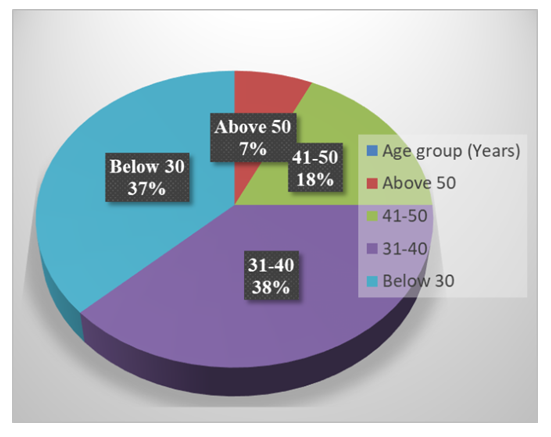 | Figure 1. Field Data Age Distribution |
3.3. Gender of Respondents
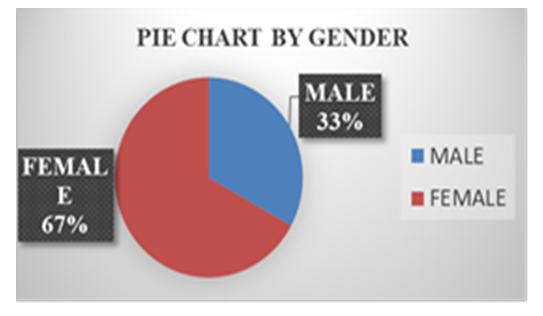 | Figure 2. Field Data -Gender Respondents |
3.4. Respondents by Business Category
 | Figure 3. Field Data- Business Category |
3.5. Business Type
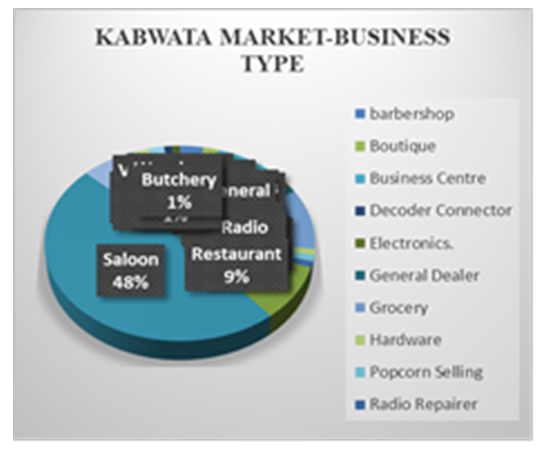 | Figure 4. Field Data- Business Type |
3.6. Effectiveness of Coping Business Mechanism
- The finding to whether a substitute from energy power to other coping mechanisms has been established above. It is interesting to note that on average, all coping mechanisms opted for are either less or not effective. There could be various reasons as to why energy power is more effective compared to their options. Not everyone can afford a generator with all its associated costs. For example, generators need fuel and sometimes there is a breakdown. Fuel and breakdown are extra costs that can inconvenience business. Therefore, a generator as a coping mechanism was less effective.
|
4. Discussions of Results
- From the data obtained and analysed. It was noted that the majority would choose a certain coping business mechanism for survival only as they would not manage to employ into other tools. From the analysis and finding below are the summary of findings• The research revealed that load shedding affected business negatively: loss of production time, loss of revenue and reduction in labour force has most respondent agreed. • The results also revealed the effect on the socio-economic lives of SMEs tend to be disrupted in their day-to-day economic activities as they depend on electricity, so this negatively affects them and their businesses.• It was reported that these SMEs employ different coping mechanism strategies. However, most SMEs opted for less effective ones as the most effective ones such as Generators and solar initial investment cost is expensive and only few can afford.
5. Conclusions
- The research concludes that load shedding had far more negative impacts on the female businesses of SMEs at Kabwata Market in Kabwata Constituency of Lusaka. Its impact was evidently portrayed on production, profit and workers and finally trickled down to the socio-economic life of the female proprietors of SMEs. Because of the negative impact on production, profit and workers, female proprietors of SMEs engaged various coping mechanism strategies. However, most of the coping mechanisms of most owners of those SMEs were less effective as compared to the use of energy power. To those negative impacts, certain things can be done to revive their businesses. The research revealed that load shedding negatively affected production, profit, and workers through various ways. Below are various conclusions:• On production, through various variables that were tested. The impact was revealed through increased instances of loss of production time, increased instances of decrease in productivity, delayed delivery to customers, loss of market opportunities and lastly poor quality of products.• On Profit, through various variables that were tested. The negative impact was revealed through delayed delivery from suppliers mostly affected the loss of profit, increased instances of increased operating cost, increased instances of higher expenditure on alternative energy sources; increased instances of loss of revenue; increased instances of damage to plant equipment.• On workers, due to load shedding, through various variables that were tested. The negative impact was revealed through increased instances of overnight work, reduced the labour force; terminated labour force. This led to owners working for themselves as a way of mitigating their decisions on workers.• The socio-economic lives of SMEs tended to be disrupted in their day-to-day economic activities as they depended on electricity, so this negatively affected them and their businesses, their children, most households resorted to using charcoal, candles among many.• Generators, charcoal, reduced salaries, reduced salaries, reduced labour force, work at night, early closure, solar energy, power banks and invertors. It was evidenced that most coping strategies used are moderately effective. Many entrepreneurs opted for usage of less cost-effective coping mechanism such as use of charcoal, reduce labour force, early closure and at times use power banks. However, only few who can afford to acquire generators and solar system.
6. Recommendations
- The above findings from this research have revealed several concerns requiring the researcher to make specific recommendations to the readers of this research and policy makers. The following recommendations have been considered that may help the female proprietors of SMEs at Kabwata Market in Lusaka to enhance their businesses during upcoming load shedding. The recommendations are hereby chronicled below:• As long as SMEs have to survive, they have to find alternatives in life to maintain their production, profit and workers and their socio-economic life by: adopting one or two of the coping strategies identified in this current research; or they need to plan for this unending phenomenon that is getting prepared for the risks; make a small alternative investment for the coping mechanisms; for others SMEs shifting operating hours to night time in order to continue producing goods and services. • The study recommends that government provides subsidies on alternative energy appliances such as portable diesel solar generators for small business enterprises and more favourable policy on electric tariff rates for business that shift their manufacturing activities to night-time so as to reduce demand for electricity during peak periods.• For government, investment is needed other spheres such as in solar energy especially in areas where the temperatures are extremely hot; e a substitute power supply to the country during the dry season where there is constant sunlight which obviously will also reduce pressure on electricity plants.• Government to subsidise on alternative energy appliances vis a vie solar panels, genset among others good policy that allows favourable electric tariff rates during load shedding periods.• It is necessary to ensure that the country invest more on energy production from various water body resources.• Government is responsible for the supply of electricity must also ensure that sufficient research and resources are directed to ensure a constant and stable supply of electricity in the markets. • ZESCO should issue an effective load shedding program in advance. This will allow businesses (SMEs) to plan and implement measures to minimize costs and maximize their efficiency during downturns.• The Government needs to promote more Independent Power Producers initiative (IPPs) to develop micro and small hydropower projects by encouraging investment in them.• Governments must also ensure that sufficient research and resources are directed to ensure a constant and stable supply of electricity in the markets.
ACKNOWLEDGEMENTS
- I acknowledge the valuable assistance and support of the following:• Dr Simon Tembo (UNZA).• University Of Zambia -Graduate School Of Business.• Kabwata Market Leadership and all research participants.
 Abstract
Abstract Reference
Reference Full-Text PDF
Full-Text PDF Full-text HTML
Full-text HTML